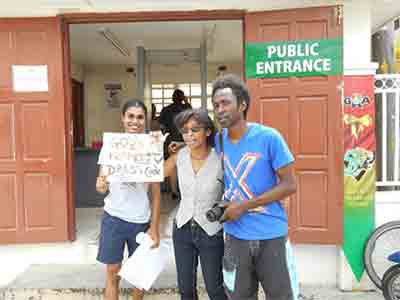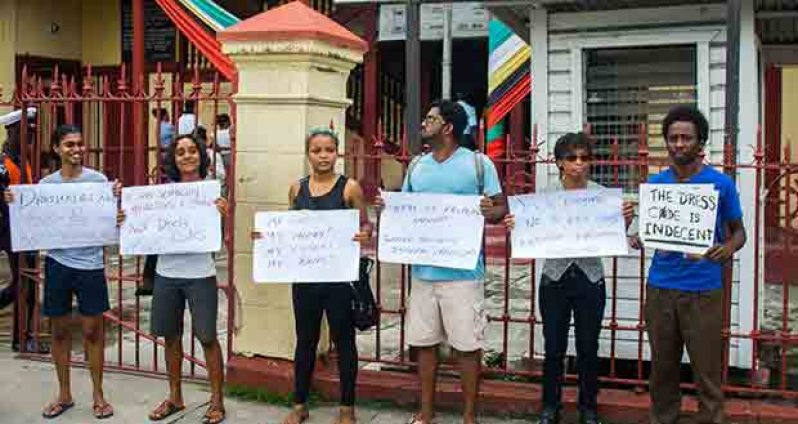– What’s hot, what’s not
Pull quote: “It is a relic of our colonialist past which, like colonialism itself, should remain in the past.”
By Subraj Singh

Photo Credit: Sherlina Nageer)
Late last month, a group of six people assembled themselves at the Georgetown Magistrate’s Court in Georgetown and dedicated their entire morning to peacefully protesting the dress codes (not laws, but rules) that have been described by President Granger himself as being “backward” and “archaic.” Long before that description was offered by President Granger, there were many people, particularly those who have to conduct business with the many government agencies that strictly adhere to dress codes, who recognized such rules to be anti-progressive and nothing more than mere hand-downs from the colonial age that were allowed to continue to flourish and hamper the lives of the Guyanese people in more ways than one.
The six who took part in the protests are the tiniest of fractions of the whole that wish to see the removal of the rules masquerading in the minds of the Guyanese populace, because of how long they have been in existence, as “laws.” These rules serve to label the clothing being afforded by poor Guyanese as “improper” and such rules contradict the logical choices of attire chosen by Guyanese who recognize the country as a tropical one set close to the equator where it is simply not feasible to be in long trousers and long-sleeved shirts all day if one is to be comfortable enough to accomplish the tasks he/she has to do in a day.

Such rules are, in fact, incredibly sexist in the way they dictate the ways in which the body of a woman must be covered, and highlight the great divide represented in how those of the upper class are allowed entry (regardless of whether their outfits are sleeveless or short) into institutions where the poor are denied access if they wear clothing that are sleeveless or short. Dress codes stifle the freedom of expression of individual Guyanese and are nothing but another meaningless hindrance faced by the Guyanese people on a daily basis. It is a relic of our colonialist past which, like colonialism itself, should remain in the past.
As I walked around Georgetown with the other protesters under the blistering Guyanese sun, many facets of our society were revealed and many of our challenges and problems came creeping out of the shadows. As we walked from the High Court to the National Library to the First Lady’s Office to the Ministry of Education and the other places where dress codes are enforced, I realized that the dress code is merely symptomatic – and was reflecting the many other, deeper, more complex issues that are allowed to fester in the Guyanese society. For example, it is now more obvious than ever that sexism is alive and runs rampant in Georgetown.
Most of the protesters were women. Many of the people we ran into on the streets were women. Most of the people who were in favour of abolishing the dress codes were women. Most of the people who wanted to keep the dress codes were men.
At the Berbice bus park, opposite the High Court, we encountered a group of men who began an argument, the core of which was basically that dress codes are progressive and should not be removed because women might want to wear clothes exposing their midriffs and shoulders. When asked what the problem with that was, some of the men tried to argue that such clothes can cause men to become aroused, which could lead to an escalation in the interaction between men and women wearing outfits baring their shoulders or midriffs.
Note how the essence of the argument being put forward by the men is built on patriarchy and sexism: The men believe that dress codes force women to be “properly” covered and that this is a good thing because it prevents them from being sexually aroused by the women. Conversing with the men was basically a lesson in how sexism works: Women must be governed, controlled, forced to where what the system tells them to wear because men cannot control their impulses at the sight of a woman who bares her midriff.

Georgetown, showcasing the message that the
President has referred to as “backwards” and
“archaic.” Photo Credit: Akola Thompson)
Things between the men and the protesters escalated when one of the men, who had to be physically restrained by his friends, started shouting that women should not wear “men’s clothes” such as, according to him, pants. Clearly the conversation on dress codes managed to unearth quite a few sexist ideologies that morning. It is obvious that some men view the dress code as a way of further controlling women. The dress codes, therefore, is another cog in the great machine of patriarchy that keeps on turning, ceaselessly, in Guyana.
It is important to note that the protesters encountered another bunch of taxi drivers on Main Street whose views were completely opposite to those encountered earlier. They supported the repeal of dress codes and offered their own stories of how dress codes hindered themselves and people they know, including women.
Whenever we came across people who supported the dress code, the protesters would try to ask why those people were in support of it. One of the dominant reasons was the belief that if dress codes are dissolved, there would be some sort of moral degradation where people would start strolling into buildings in a semi-nude or mostly-nude state. This argument is interesting because, as pointed out by activist, Sherlina Nageer, on the day of the protest, it seems as though people who adhere to that type of thinking are refusing to give enough credit to their Guyanese brothers and sisters.
If the dress codes are repealed, then is it realistic to expect people to start going into buildings in such a state of indecency that is expected to be, in some way, harmful to society? Are we, as a nation, lacking the common sense that tells us that we must wear clothes in order to go into buildings? The people who say that removing dress codes will lead to moral degradation and people entering buildings in their underwear does not seem to think that a great majority of the Guyanese population has the common sense or societal instinct which says that we must wear clothes.
Clearly, Guyanese people do not think much of each other if this is what they expect their brothers and sisters to immediately start doing if the dress code system collapsed. Not only is this insulting to us all, but it also highlights the kinds of arguments that are being offered in favour of keeping the dress codes: Nonsensical arguments. The Guyana Revenue Authority has recently rescinded its dress code. Have there been ANY examples of people going there in a manner of extreme indecency to pay their taxes? The answer to that question is a resounding no.
Even the second most popular reason (that dress codes have been there for a long time, that they are a tradition and, therefore, must not be removed) for not abolishing the dress code is not rooted in logic. Should we keep something in place only because it has been there for a while? With such mentality roaming our streets, how are we, as a nation, supposed to progress and move forward?
People came forward and through them we heard stories that we ourselves knew and we learned of stories that were entirely new to us. We learned of people who lived out of the city, from as far as Berbice, coming to town to transact business only to be turned away because they were wearing clothing that was deemed improper and did not adhere to the dress codes. Imagine being that person and having to travel all the way back to Berbice without completing the task you came for. This can result in a loss of time and money, something that does not seem to be a concern for proponents of the dress codes.
There was an even more terrifying story, for example, of institutions where security guards are renting jackets out to visitors that they deem to be improperly dressed. Why should anyone have to pay money when the clothes they wear are perfectly respectable and decent? The dress codes allow for a further fleecing of the Guyanese people while exposing them to health risks that I am sure comes with wearing a jacket that has been worn by the many other people who were forced into it. Then there are cases where sign boards, highlighting what visitors are or are not allowed to wear are completely absent and, even so, when the unsuspecting person arrives they are turned away based on rules that are not publicly viewable.
When we got to State House, at the office of the First Lady, Mrs. Sandra Granger, we realized that there was a great irony in play. The First Lady has popularised the sleeveless dress and has helped to return it to a place of prominence among those who are gifted with the knowledge of fashion. Yet, visitors are not allowed to wear sleeveless clothing when visiting the office of the First Lady – a law laid down by the security guards apparently, as there is no visible sign of what one should and should not wear. Is this hypocrisy or classism, where only people belonging to the upper classes, the elites, get to flout rules that condemn and crush the poorer people? Isn’t the tenet of equality being destroyed in cases where certain types of people or people from certain sections of society do not necessarily have to conform to rules that the rest of us have to go up against?
From the interactions gleaned on that occasion, it is obvious that dress codes are both symbols of and catalysts for many things in our society that are negative and hold us back from progressing. If the President himself believes in the pointlessness of dress codes, then what does it say about our society when society itself refuses to acknowledge this, and the fact that there is no solid reason for keeping such codes in place? It is known that our country does not like the concept of change. Some necessary changes took years of activism to arrive in Guyana. Hopefully, the people of Guyana recognize that dress codes should not fall into this category, where nothing is done about it for even more years, and that it should be removed immediately.




.png)









